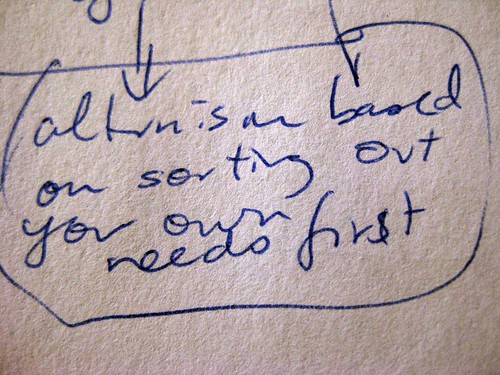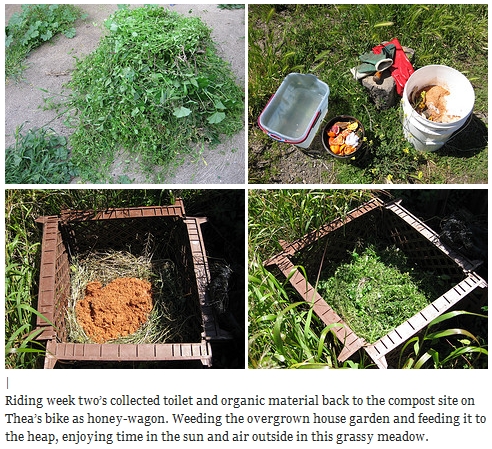
The last time I flirted with permaculture (in late 2008), I got very excited about shit.
Having attended Milkwood’s intro to permaculture course, I raved to anyone who would listen, about the idea of recycling the energy which constitutes our own shit, to use it again and again – rather than flushing it away to a non-usable state out in the ocean somewhere.
However – besides an ongoing fascination with my compost heap (a way of recycling the energy in scrap foods and plant residues, but not shit) – my “human shit ambition” has been just sitting there, waiting for something to happen. I haven’t managed to crack how to use it within an urban context (not within the constraints of my rental tenancy situation anyway).
My friend Lisa was able to carry out some experiments in the area of shit-cycling (see her blog entry about it here), inspired by Joseph Jenkins’ Humanure Handbook. But even her valiant attempts remain exemplary demonstrations – as yet, they have not resulted in an ongoing inner-urban poo-fertilizer system…

[Lisa’s humanure system in progress. Details here.]
The way things are going, I reckon it won’t be long before the tide turns, and council-approved humanure dunnies return to our yards. Say, ten years? Now THAT, Mr Rudd, is a vision for 2020…
(Sure, what do I know of prediction? But to see the shift in other things – re-usable shopping bags, disposable coffee cups… In a surprising move, Marrickville Council is now even approving of reclaimed verge gardens! Things seem to be on the move in these small ways…)
Anyway, nearly two years after that intro course, I’m going back for more. Time to get a bit more serious about permaculture.
One of the things I like about this course is that it’s scheduled one day each week, for 12 weeks – giving me the rest of the week to digest and apply all the ridiculously detailed downloads from Nick and Kirsten‘s brains. The internalising of this stuff then might become a part of my own weekly cycle of living – rather than being a massive disruption from the process of daily life. That’s the idea anyway.
Here are a few things which struck me from my first day of being a student again. These were not exactly official course content, but rather what’s bouncing around in my head as a result of sitting in class all day. I hope over the next couple of months I can go a bit deeper into understanding them:
-The question concerning ‘sustainability’.
If I had a dollar for every time I heard the word ‘sustainable’… But how can you measure if a thing or activity is sustainable? By using an environmental audit? If so, what is included, and what is excluded from such an account? What about the paper and electricity used by the accountant while adding up my carbon emissions? What about the accountant’s coffee which has travelled 2000 km, only to be washed away uselessly as poo, into the ocean. Is that accounted for?
So ‘sustainable’ has become a meaningless term. Or rather, its meaning has shifted – it’s now a savvy business concept. Or at least it was, up until recently… Things move fast! Smart businesses will, I reckon, already be considering the next branding catch phrase, given the greenwash drowning all this stuff: our sustainability fatigue…
Following on from this notion that one’s environmentally damaging processes can be accounted for, is the idea that they might be traded. My classmate Todd told me about a funny project called Cheat Neutral, where you can offset your marital infidelity by paying a small amount of cash to someone who pledges to remain faithful to their partner. Obviously, it’s a spoof on the whole carbon emissions offsetting scheme (right?). (As Todd says, when you turn these intangibles into commodities, corruption is never far behind.)
Here are a few links which rose to the surface during the course:
Maslow’s Hierarchy of Needs. Everybody in the class seemed to have heard of this except Nick (and me). Where did you all come across this concept? Altruism based on sorting out your own needs first…
Analysis Paralysis: what we need to steer clear of, even though we begin to gather a shitload of info.
John Seymour on Self-Sufficiency: Apparently even this SS guru is critical of the notion of absolute self sufficiency, which would imply social detachment… (I want to think more on the problems with self sufficiency and sealed-systems soon…)
Path to Freedom self-sufficiency homestead. Apparently these guys feed 4 people from 400 square metres of land. This is ridiculously low compared to the 25000 square metres which are needed to feed the average human being on the planet. (75000 square metres for Aussies).
ps – Todd the classmate also introduced me to the notion of ‘skunkworks‘ as a design process.
Crazy stuff.
Learning so much just from that one day…
We covered Maslow’s Heircachy of needs in year 10 religion at the rural catholic highschool I attended in the ’80’s.
I used to quote it at xtian evangelists when I was a nervous 17 year old at uni, before I became a headspinning firebreathing socialist feminazi….
Mayhem, there is so much I’d like to ask you to expand on here. Wow.
I have a very battered John Seymour book that was one of my very first gardening bibles. Back in the Jurassic. And I’ve got to very nearly self sufficient for a while. But I agree with him that self-sufficiency is not the point. Social isolation is a punishment, not an aim. But there’s another idea in there somewhere about money and micro-economics – Money is a very useful medium of exchange and a nicely nuanced and responsive way of setting up a feedback system that reduces “work” and “waste”. At least is could be, should be….
Linda, thanks for that. Do you have any more leads for reading around money? I am interested to follow that up…